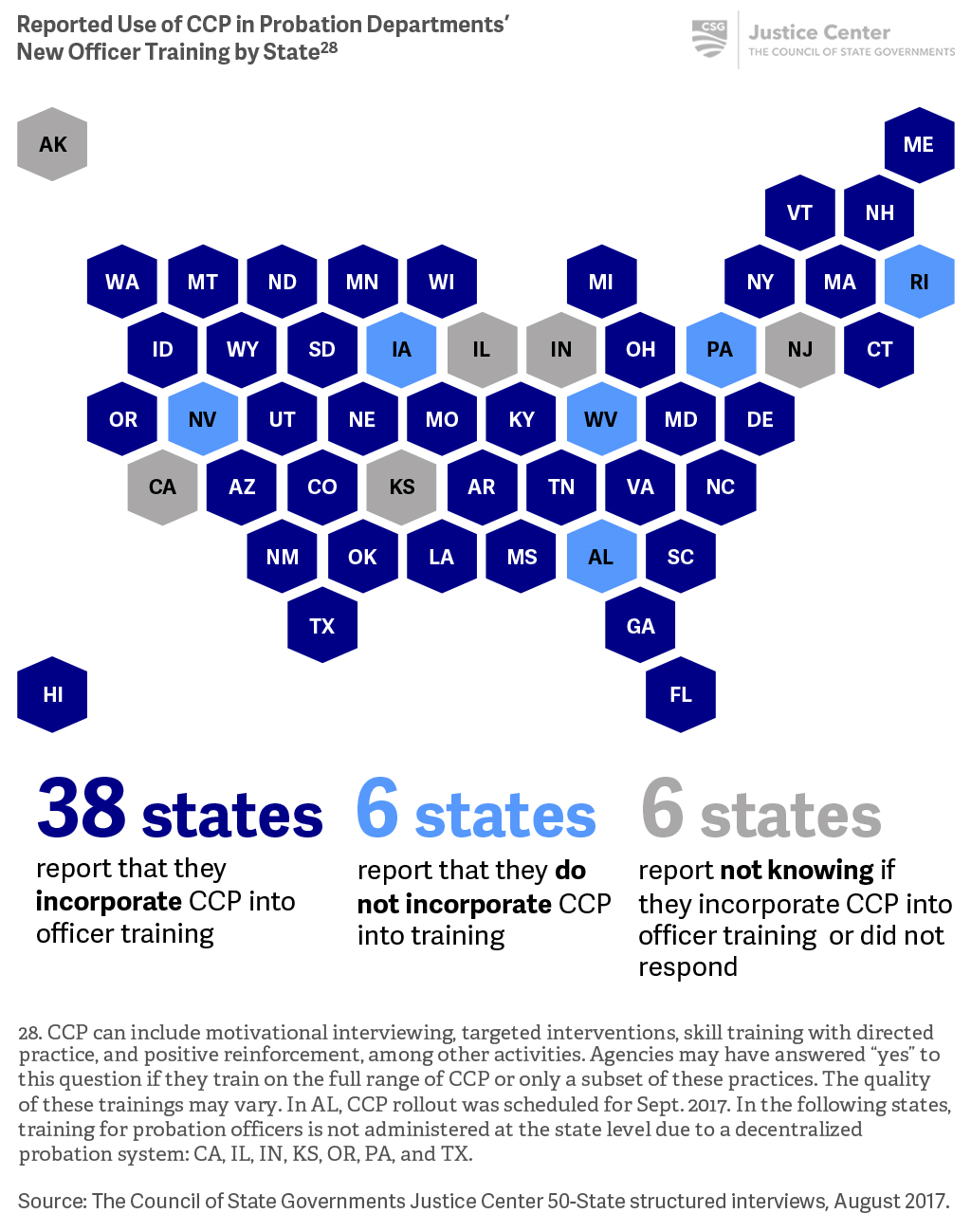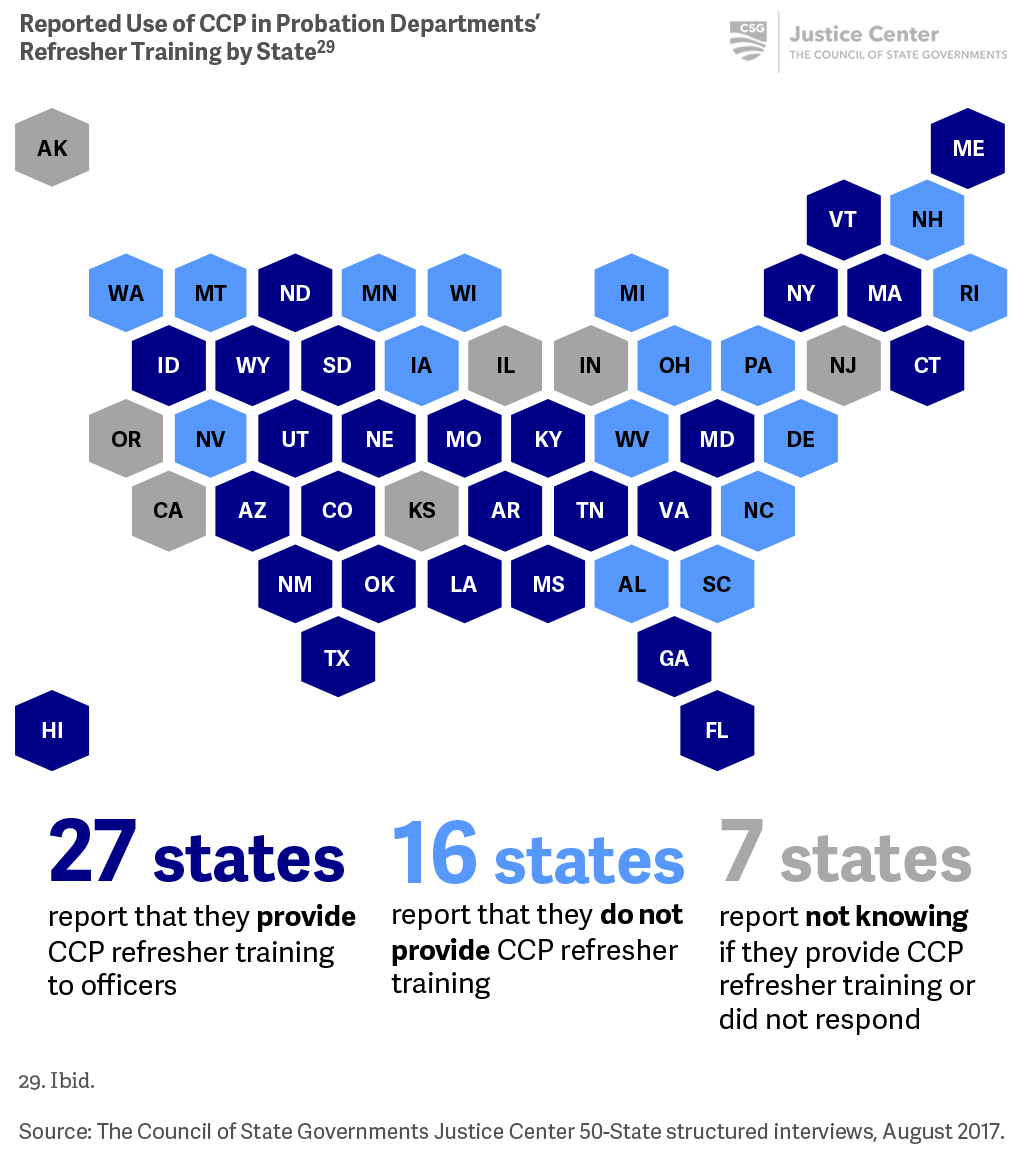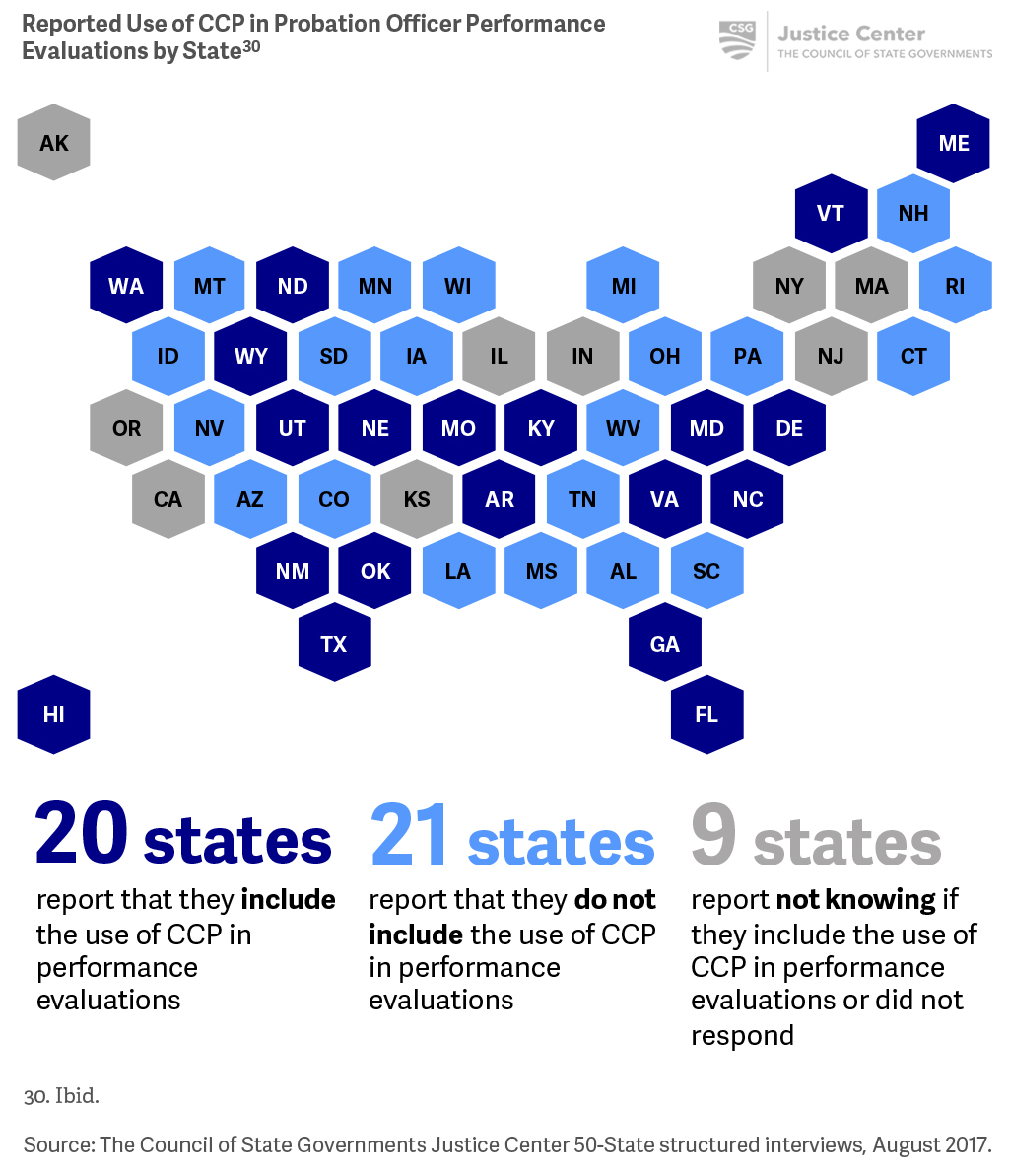Part 2, Strategy 3
Action Item 2: Improve supervision workforce practices, such as hiring, training, and evaluation.
Why it matters
Just as decreasing class size in schools is necessary but not sufficient to improve education outcomes, decreasing caseload sizes alone will have little benefit unless probation and parole officers are trained to work with people on supervision to help them avoid drug use, find and retain employment, gain self-control, and manage peer influences. Different staff positions require different skill sets and types and depth of knowledge, which need to be reflected in job descriptions, training, performance evaluations, and promotion opportunities. Supervision agencies are moving away from focusing mainly on compliance monitoring and reacting to violations to adopting a more effective and proactive approach to supervision that balances probationers’ accountability and behavior change with the application of the risk-needs-responsivity (RNR) principles that research shows are effective at reducing recidivism.
To achieve results, supervision agencies are recruiting and hiring people who fit this paradigm of officer responsiveness. Officer training is expanding beyond defensive tactics, arrest procedures, and firearms training to include core correctional practices (CCP) and RNR principles, but there is still room for improvement. Research shows that supervision staff who are trained in applying the RNR principles, in conjunction with CCP, use these skills more than staff without training, and people on their caseloads have higher success rates on supervision.[27]
Supervision officers and correctional staff need training on CCP and the RNR principles as part of the onboarding process and periodically thereafter to help staff maintain and hone their skills. Time spent on these trainings needs to be at least comparable in length to time spent on defensive tactics and firearms.
Incorporating CCP into staff performance evaluations will help ensure that staff adopt these practices and that the people who use CCP are promoted.
What it looks like
- Revise supervision officer recruitment and hiring practices to target people who are interested in helping people change their behavior and holding them accountable.
- Require supervision staff to receive training on RNR principles and CCP as part of onboarding and periodically thereafter.
- See Case Study: State leaders support training efforts
- Include use of CCP in supervision staff’s performance reviews and promotion consideration.
Key questions to guide action
- What are the current onboarding training requirements for supervision staff?
- Are there requirements for staff to receive periodic refresher training on CCP?
- Do supervision agencies incorporate use of CCP in performance reviews?
- How can training for your state’s probation and parole officers be improved?
Use the information that follows to inform your answers to these questions.
Three-quarters of states report that new probation officers are trained in core correctional practices (CCP) that are critical to helping people on supervision learn to change their behavior and succeed in the community.

Only half of states report providing CCP refresher training to probation officers. Ongoing training helps officers maintain skills and ensures consistency in supervision.

Only 20 states report using CCP in probation officer performance evaluations, which can help ensure that staff adopt these practices and that the use of CCP is considered when promoting staff.

Additional Resources
Improving supervision practices
To break the cycle of reoffending, supervision agencies need to continue improving supervision practices. A recent paper identifies four principles of community corrections: to promote the well-being and safety of communities; to use the ability to arrest, discipline, and incarcerate parsimoniously; to recognize the worth of people in the criminal justice system; and to promote the rule of law, respecting the human dignity of people under supervision and treating them as citizens in a democratic society. To fulfill those four principles, the paper proposes 13 goals, including moving away from punishing failure to promoting success and moving from “gut-based” supervision approaches to evidence-based approaches. To learn more about how supervision agencies can improve practices, see the paper Toward An Approach to Community Corrections for the 21st Century: Consensus Document of the Executive Session of Community Corrections.
Charles Robinson et al. “A random study of Staff Training Aimed at Reducing Rearrest (STARR): using core correctional practices in probation interactions,” Journal of Crime and Justice 2012, 1-22.
Risk-need-responsivity (RNR) principles The RNR principles have three major components:
- Risk Principle: Match the intensity of services to a person’s level of risk for criminal activity
- Need Principle: Target criminogenic needs (factors that contribute to the likelihood of new criminal activity)
- Responsivity Principle: Account for a person’s abilities and learning styles when determining appropriate services and tailoring them to his or her needs
Core correctional practices (CCP) include relationship-building skills; effective use of reinforcement, disapproval, and authority; prosocial modeling; cognitive restructuring; social skills training; effective communication strategies, and problem-solving skills.
Case Study
State leaders support training efforts
Corrections and supervision staff who have been trained in CCP and applying RNR principles can serve as agents of change through their contact with people who are incarcerated or under community supervision.
To ensure that staff receive the necessary training, some states set requirements in statute for supervision staff to be trained on core evidence-based practices shown to change behavior.
- Idaho and Nebraska require in statute that supervision officers receive training on a range of topics including assessment techniques; risk-reduction and intervention strategies; effective communication skills; and application of cognitive behavioral interventions, reinforcements, and use of authority. As part of its training efforts, Nebraska is developing training videos and web-based tools for parole officers to ensure that evidence-based practices are continually refreshed and that officers have greater access and more frequent training opportunities than in the past.
- Maryland requires in statute that probation and parole officers, commission members, and hearing officers undergo annual training based on the most current research regarding identifying, understanding, and targeting an individual’s criminal risk factors; principles of effective risk interventions; and supporting and encouraging compliance and behavior change, including regarding the payment of restitution.
- South Dakota requires in statute that probation and parole officers are trained on evidence-based practices and how to target criminal risk factors to reduce recidivism. Further, the state requires that magistrates and circuit judges, as well as parole board members, receive training on evidence-based practices, including the use of risk and needs assessments.
Even when states don’t require training formally in statute, state leaders are engaging in efforts to ensure that their staff have the training they need to help people change their behavior.
- Pennsylvania and North Carolina created statewide training for supervision officers on the use of risk and needs assessments after requiring that probation and parole officers use risk assessment results to inform supervision practices.
- In 2014, the Vermont Department of Corrections (DOC) was awarded a Statewide Recidivism Reduction grant and determined that a portion of the funds would be allocated to providing staff with additional guidance on how to incorporate the RNR principles into their day-to-day practices. In 2015, DOC leaders developed a program to train staff on Effective Practices in Community Supervision (EPICS), which was developed to support the systematic, practical application of the RNR principles. As part of the training effort, DOC leaders ensured case management staff were trained on the EPICS model, cultivated a cohort of internal trainers, and developed an online training module that provides ongoing booster sessions to ensure that staff skills remain up-to-date.
Even in states where probation is run at the county level, states can support training efforts.
- In Arizona, anyone hired as a probation officer by any of the state’s 15 probation departments is required to attend an academy designed to provide basic training to all probation officers. Academy standards are set by a committee consisting of state and local members.
- In Texas, the Department of Criminal Justice Community Justice Assistance Division is responsible for developing standards, tracking performance, monitoring and reviewing budgets, and providing training to staff of the 123 community supervision and corrections departments in the state.
